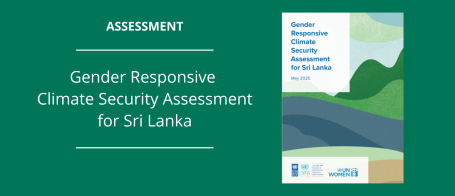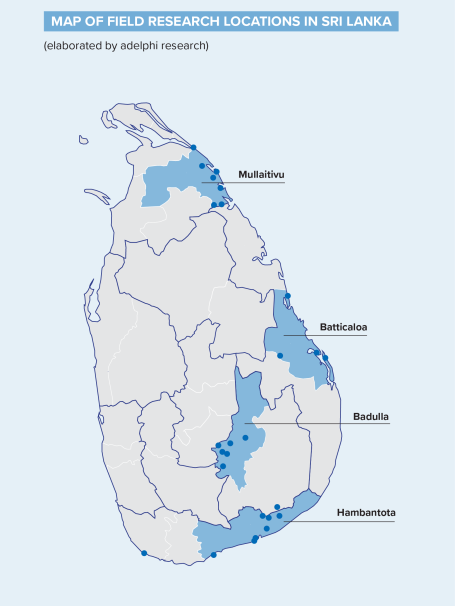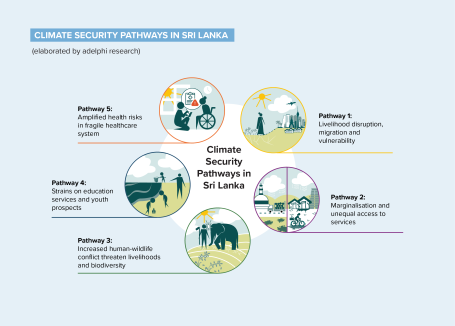Gender Responsive Climate Security Assessment for Sri Lanka

Read the full report here
The Report and Methodology

The report is the first gender-responsive climate security assessment for Sri Lanka and the Asia-Pacific region. It is part of a joint initiative supported by the UNDP-DPPA Joint Programme and UN Women and was carried out by adelphi research.
More than 165 people from 50 towns across Badulla, Batticaloa, Hambantota and Mullaitivu districts participated in interviews and focus groups. This included women, men, youth, different livelihoods, ethnic and religious groups.
The report examines how gender roles, norms and inequalities intersect with climate and security challenges in Sri Lanka. It aims to ensure that Sri Lanka’s climate action maximises opportunities for building and sustaining peace, social cohesion, and gender and ethnic equality.
Key insights include:

- Pathway 1: Livelihood disruption, migration and vulnerability
- Erratic rainfall, rising temperatures and extreme weather events disrupt farming, fishing and livestock rearing livelihoods and decrease crop yields.
- Migration has become a coping strategy. The departure of working-age adults hollows out rural economies and increases the burden on communities left behind. Women often take on additional income generation and caregiving roles.
Diversifying livelihoods (e.g. climate resilient livelihoods like polytunnel farming, mushroom cultivation and spice production) can reduce migration pressures and foster collaboration.
- Pathway 2: Marginalisation and unequal access to services
- Perceived inequalities in service provision and investment along ethnic, religious and rural-urban lines exacerbate social tensions.
- Respondents in the Northern and Eastern Provinces highlighted regional and ethnic divides.
- Respondents in the Southern and Uva Provinces highlighted class-based divisions.
- Concerns over transparency in decision-making (e.g. setting agricultural calendars or rehabilitating irrigation tanks) further hinder trust in governance.
Prioritising equitable service delivery and investments in rural infrastructure can build trust and reduce perceptions of exclusion.
- Perceived inequalities in service provision and investment along ethnic, religious and rural-urban lines exacerbate social tensions.
- Pathway 3: Increase human-wildlife conflict threaten livelihoods and biodiversity
- Climate change, deforestation and human encroachment into wildlife habitats have intensified clashes between people and wildlife.
- Women responsible for farming and household management face risks in daily tasks like tending crops and collecting water, as well as caregiving for family members injured in a clash.
- Communities in the North and East perceive disparities in government support and believe they face more frequent elephant incursions due to infrastructure development in the South.
Engaging communities in human-wildlife conflict management (e.g. watchtower networks and coordinated elephant deterrent systems) can strengthen inter-community ties.
- Pathway 4: Strains on education services and youth prospects
- There are gendered barriers to education:
- Girls face caregiving responsibilities and early marriage.
- Boys are more likely to drop out of school for seasonal agricultural work or to migrate for work.
- Poor provision of public education and high private tuition create socioeconomic barriers.
- Disillusionment about the value of education is growing among youth, especially boys.
Adapting education systems to climate pressures through flexible learning programmes and vocational training can foster inter-group engagement and inclusion.
- There are gendered barriers to education:
- Pathway 5: Amplified health risks in fragile healthcare system
- Underfunding and inequality of healthcare provision, including shortages of medical staff, medicine and diagnostic equipment in Mullaitivu and Batticaloa, force many to rely on costly private pharmacies or forgo treatment.
- Language barriers in hospitals and inadequate healthcare provision on tea plantations exacerbate tensions.
- Climate change exacerbates health risks, including heat stress, spread of vector-borne diseases, and chronic kidney disease.
Strengthening healthcare systems, including investments in flood-proof infrastructure and mobile clinics, can improve trust and resilience.
Recommendations:
1. Harness climate action for peace and good governance
Break down national climate targets into local plans, strengthen cross-sector coordination, ensure equitable resource distribution, and establish diverse community committees for resource management.
2. Tailor adaptation by region
- Dry Zone: Focus on irrigation, rainwater harvesting, and waste management.
- Wet Zone: Improve drainage, flood-resilient housing, and urban green spaces.
- Intermediate Zones: Integrate watershed management and prioritise climate-resilient housing and water access.
3. Address sector-specific climate security risks
- Livelihoods: Support diversification and job training, expand social safety nets.
- Human-wildlife conflict: Promote local solutions, agroforestry, and mitigation infrastructure.
- Development: Ensure climate-informed, equitable infrastructure and inclusive tourism.
- Health: Provide culturally sensitive care and resilient health infrastructure.
- Education: Upgrade schools, expand financial support, and strengthen climate-focused vocational training.
- Renewable energy: Support community-driven projects, target marginalised groups, and build local capacity for equitable climate action.
This report was commissioned by the UNDP–DPPA Joint Programme and UN Women with the support from the Government of Australia, and conducted by adelphi research using the Weathering Risk methodology. The publication can be downloaded here.
Share on

